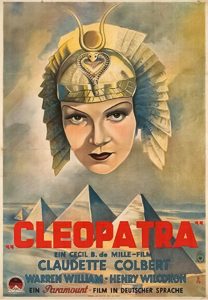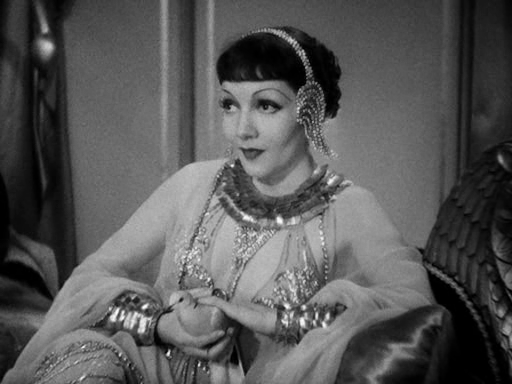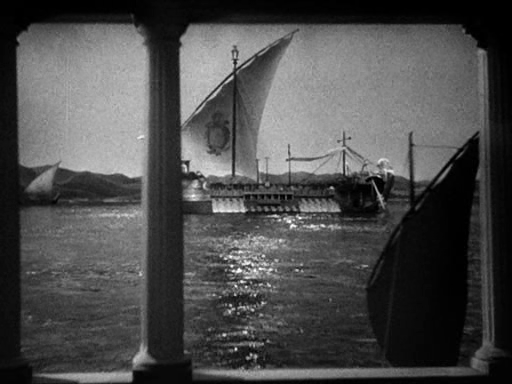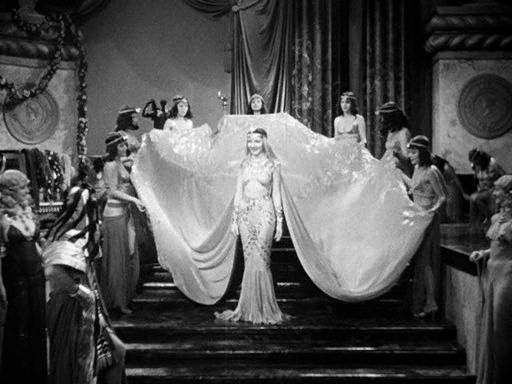|

Synopsis:
When wily Queen Cleopatra (Claudette Colbert) is kidnapped and taken to Rome, she woos both Julius Caesar (Warren William) and his successor, Marc Anthony (Henry Wilcoxon), in an attempt to gain power — but soon she finds herself genuinely in love.
|
|
Genres, Themes, Actors, and Directors:
- Ancient Greece and Rome
- Cecil B. DeMille Films
- Claudette Colbert Films
- Egypt and Egyptology
- Historical Drama
- Royalty and Nobility
- Star-Crossed Lovers
- Strong Females
- Warren William Films
Response to Peary’s Review:
Peary writes that while “Cecil B. DeMille’s classic is silly, creaky, and full of long-winded tete-a-tetes”, it’s nonetheless “fun to watch”. He points out that Colbert “is an extremely sexy Cleopatra”, “lounging around in skimpy bare-midriff outfits that Madonna might have designed”, yet also “possesses enough intelligence to realize that through her singular powers of seduction she can outwit and manipulate her Roman men”.

He argues that “Colbert fits into the vamp tradition of Theda Bara, who played Cleopatra in the silent era” and that the “picture’s theme is that women can emasculate great male warriors and statesmen, but we can forgive this Egyptian trapped on foreign soil because she must find some way to survive in a male-dominated, woman-hating… world.” Peary’s review is spot on: I was surprised to enjoy this costume drama as much as I did, especially the unintentional humor garnered from Colbert’s not-so-subtle seduction ploys and her ripe dialogue with her lovers. The scene in which she tells Antony that fisherman are gathering clams for dinner — then we see a net full of beautiful consorts emerging from the sea, bearing open shells with jewels — is especially chuckle-worthy.

Redeeming Qualities and Moments:
- Claudette Colbert as Cleopatra

- Victor Milner’s Oscar-winning cinematography

- Wonderfully elaborate sets and costumes (check out TCM’s article for more on the latter)


Must See?
Yes, as an enjoyable early costume drama.
Categories
Links:
|







3 thoughts on “Cleopatra (1934)”
Love this film. I’m a big fan of Egyptiana and mummies etc and this one is prime Hollywood golden age glorious. It’s also precode so is much more racy in it’s dialogue and with some surprising nudity. I’d love to see this in Grauman’s Egyptian with a suitable buffet in acompanyent!
Funny how the 1963 film is more chaste.
Not must-see – but film fanatics who have a special interest in ‘spectacle’ will definitely want to check it out.
Those who have seen a few DeMille films know that they’re a mixed bag. None of them are particularly great, and a number of them are downright dull. They have a predilection toward being BIG. (The only one that remains significantly memorable for its ‘bigness’ – in so many ways – is DeMille’s own 1956 remake of’The Ten Commandments’.)
DeMille used scripts that are often talky or clunky. And one doesn’t really watch a DeMille film for its performances. While the better actors in them found a way to rise above, DeMille wasn’t ‘an actor’s director’. His directorial philosophy was one of surface. Depth or nuance didn’t really seem to be his thing.
The ‘saving grace’ of DeMille’s better films – and ‘Cleopatra’ is, at least, one of his better films – is his showman spirit. ‘Cleopatra’ has a combination of elements that result in a more effective balance, and that makes for a more fluid presentation. It’s a relatively interesting watch. (The battle sequence near the end is captured especially well and is effectively edited.)
Of course, in some of DeMille’s bigger spectacles, the camp element is never far away. It’s certainly much more prominent in ‘The Ten Commandments’ but ‘Cleopatra’ does have a number of sequences involving ‘camp lite’ (i.e., some of the ceremonial festivities on-board Cleopatra’s insanely large barge).
I’d say this is a must see as a significant entry from DeMille and as a significant pre-code film and star vehicle from the first half of that decade.